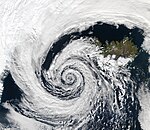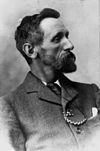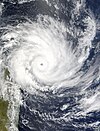Portal:Weather
The weather portal
Weather is the state of the atmosphere, describing for example the degree to which it is hot or cold, wet or dry, calm or stormy, clear or cloudy. On Earth, most weather phenomena occur in the lowest layer of the planet's atmosphere, the troposphere, just below the stratosphere. Weather refers to day-to-day temperature, precipitation, and other atmospheric conditions, whereas climate is the term for the averaging of atmospheric conditions over longer periods of time. When used without qualification, "weather" is generally understood to mean the weather of Earth.
Weather is driven by air pressure, temperature, and moisture differences between one place and another. These differences can occur due to the Sun's angle at any particular spot, which varies with latitude. The strong temperature contrast between polar and tropical air gives rise to the largest scale atmospheric circulations: the Hadley cell, the Ferrel cell, the polar cell, and the jet stream. Weather systems in the middle latitudes, such as extratropical cyclones, are caused by instabilities of the jet streamflow. Because Earth's axis is tilted relative to its orbital plane (called the ecliptic), sunlight is incident at different angles at different times of the year. On Earth's surface, temperatures usually range ±40 °C (−40 °F to 104 °F) annually. Over thousands of years, changes in Earth's orbit can affect the amount and distribution of solar energy received by Earth, thus influencing long-term climate and global climate change.
Surface temperature differences in turn cause pressure differences. Higher altitudes are cooler than lower altitudes, as most atmospheric heating is due to contact with the Earth's surface while radiative losses to space are mostly constant. Weather forecasting is the application of science and technology to predict the state of the atmosphere for a future time and a given location. Earth's weather system is a chaotic system; as a result, small changes to one part of the system can grow to have large effects on the system as a whole. Human attempts to control the weather have occurred throughout history, and there is evidence that human activities such as agriculture and industry have modified weather patterns.
Studying how the weather works on other planets has been helpful in understanding how weather works on Earth. A famous landmark in the Solar System, Jupiter's Great Red Spot, is an anticyclonic storm known to have existed for at least 300 years. However, the weather is not limited to planetary bodies. A star's corona is constantly being lost to space, creating what is essentially a very thin atmosphere throughout the Solar System. The movement of mass ejected from the Sun is known as the solar wind. (Full article...)
Selected article

Hurricane Floyd was the sixth named storm, fourth hurricane, and third major hurricane in the 1999 Atlantic hurricane season. Floyd triggered the third largest evacuation in US history (behind Hurricane Gustav and Hurricane Rita, respectively) when 2.6 million coastal residents of five states including Florida were ordered from their homes as Hurricane Floyd approached. The Cape Verde-type hurricane formed off the coast of Africa and lasted from September 7 to September 19, peaking in strength as a very strong Category 4 hurricane—just short of the highest possible rating—on the Saffir-Simpson Hurricane Scale. It was among the largest Atlantic hurricanes of its strength ever recorded.
Floyd struck The Bahamas at peak strength, causing heavy damage. It then paralleled the East Coast of the United States, causing massive evacuations and costly preparations. The storm weakened significantly, however, before making landfall in North Carolina as a Category 2 hurricane, and caused further damage as it traveled up the Mid-Atlantic region and into New England.
The hurricane produced torrential rainfall in eastern North Carolina, adding more rain to an area hit by Hurricane Dennis just weeks earlier. The rains caused widespread flooding over a period of several weeks; nearly every river basin in the eastern part of the state exceeded 500-year flood levels. In total, Floyd was responsible for 57 fatalities and $4.5 billion ($6.0 billion in 2008 U.S. dollars) in damage, mostly in North Carolina.
Recently selected articles: Hurricane Dean, Weather forecasting, Climate of India, More...
Did you know (auto-generated) -

- ... that extreme event attribution estimates how much climate change causes weather events, such as the 2021 Western North America heat wave?
- ... that Japanese actor Kouhei Higuchi prepared for his role on the television drama adaptation of My Personal Weatherman by learning from a weather forecaster?
- ... that weather whiplash is the phenomenon of rapid swings between extremes of weather conditions?
- ... that the weather forecast for HD 189733 b is "Westerly winds at 2000 m/s, with molten glass showers"?
- ... that an attempted British-Norwegian attack on the German battleship Tirpitz was abandoned after two Chariot manned torpedoes were lost due to bad weather?
- ... that Eric Berger wrote about weather for the Houston Chronicle even before he became a certified meteorologist?
Selected image

Cyclone Catarina, the only major tropical cyclone ever observed in the Southern Atlantic Ocean, as it appeared from the International Space Station on March 26, 2004.
Recently selected pictures: Roll cloud, Hoar frost, Snowflakes, More...
More did you know...
...that the Flying river is the name given to the transport of water vapor from the Amazon rainforest to southern Brazil?
...that hurricane shutters are required for all homes in Florida unless impact-resistant glass is used?
...that the Joint Institute for Marine and Atmospheric Research is a combined weather and ocean research institute with the cooperation of the Office of Oceanic and Atmospheric Research and the University of Hawaiʻi?
...that the SS Central America was sunk by a hurricane while carrying more than 30,000 pounds (13,600 kg) of gold, contributing to the Panic of 1857?
...that a hurricane force wind warning is issued by the United States National Weather Service for storms that are not tropical cyclones but are expected to produce hurricane-force winds (65 knots (75 mph; 120 km/h) or higher)?
...that the Automated Tropical Cyclone Forecasting System is a software package for tropical cyclone forecasting developed in 1988 that is still used today by meteorologists in various branches of the US Government?
Recent and ongoing weather
- Wikinews weather portal
- March 26, 2021: Tropical moisture ceases to cause severe floods in South East Australia
- February 19, 2021: Winter storms hammer Texas, fatalities reported
- December 28, 2021: Typhoon Phanfone strikes Philippines
- February 1, 2022: Deadly floods in Brazil after heavy rainfall
- April 15, 2022: South African floods kill at least 300 people
- Weather of 2024
- 2024 Atlantic hurricane season
- 2020–21 North American winter
- 2024 Pacific typhoon season
- Tornadoes of 2024
This week in weather history...
May 7
1981: Tropical Storm Arlene moved across Cuba. Minimal damage was reported.
May 8
2009: A severe derecho blew across a large part of the United States, spawning 39 tornadoes and killing six people.
May 9
2002: Cyclone Kesiny made landfall near Antsiranana, Madagascar, killing 33 people. Kesiny was the first tropical cyclone on record in the South-West Indian Ocean to make landfall in the month of May.
May 10
2002: A tropical cyclone struck the coast of Oman, causing severe damage and several deaths due to drowning in flash floods.
May 11
1970: Seventeen years to the day after the deadliest tornado in Texas history, another tornado struck downtown Lubbock, Texas, killing 26 people. It was the only F5 tornado in history to strike a skyscraper, which had its steel infrastructure twisted by the storm.
May 12
1970: Severe floods began in Romania, eventually killing more than 200 and leaving more than 250,000 homeless.
May 13
1998: The NOAA-15 weather satellite was launched into a polar orbit from Vandenberg Air Force Base, California. Originally planned for just a 5 year mission, as of early 2020 the satellite was still returning useful atmospheric and space data from several instruments.
Selected biography
Clement Lindley Wragge (18 September 1852 – 10 December 1922) was a meteorologist born in Stourbridge, Worcestershire, England, but moved to Oakamoor, Staffordshire as a child. He set up the Wragge Museum in Stafford following a trip around the world. He was a Fellow of the Royal Geographical Society and in 1879 was elected Fellow of the Royal Meteorological Society in London. To the end of his life, he was interested in Theosophy and spiritualism. During his tour of India he met with Mirza Ghulam Ahmad of Qadian, the founder of the Ahmadiyya movement in Islam who had claimed to be the Mahdi, the messianic redeemer awaited by Muslims. Sir Arthur Conan Doyle sought him out in New Zealand to ask for his views on spiritualism before writing The Wanderings of a Spiritualist in 1921. After training in law, Wragge became a meteorologist, his accomplishments in the field including winning the Scottish Meteorological Society's Gold Medal and years later starting the trend of using people's names for cyclones. He travelled widely, giving lectures in London and India, and in his later years was an authority on Australia, India and the Pacific Islands. (Full article...)
Previously selected biographies: Robert Case, Wladimir Köppen, More...
Related portals
Quality content
Other candidates:
- Featured Article Review: 2005 Atlantic hurricane season (Discussion)
- Featured List Removal Candidate: List of storms in the 2005 Atlantic hurricane season (Discussion)
Subcategories
WikiProjects
The scope of WikiProject Weather is to have a single location for all weather-related articles on Wikipedia.
WikiProject Meteorology is a collaborative effort by dozens of Wikipedians to improve the quality of meteorology- and weather-related articles. If you would like to help, visit the project talk page, and see what needs doing.
WikiProject Severe weather is a similar project specific to articles about severe weather. Their talk page is located here.
WikiProject Tropical cyclones is a daughter project of WikiProject meteorology. The dozens of semi-active members and several full-time members focus on improving Wikipedia's coverage of tropical cyclones.
WikiProject Non-tropical storms is a collaborative project to improve articles related to winter storms, wind storms, and extratropical cyclones.
Wikipedia is a fully collaborative effort by volunteers. So if you see something you think you can improve, be bold and get to editing! We appreciate any help you can provide!
Associated Wikimedia
The following Wikimedia Foundation sister projects provide more on this subject:
-
Commons
Free media repository -
Wikibooks
Free textbooks and manuals -
Wikidata
Free knowledge base -
Wikinews
Free-content news -
Wikiquote
Collection of quotations -
Wikisource
Free-content library -
Wikiversity
Free learning tools -
Wiktionary
Dictionary and thesaurus

































